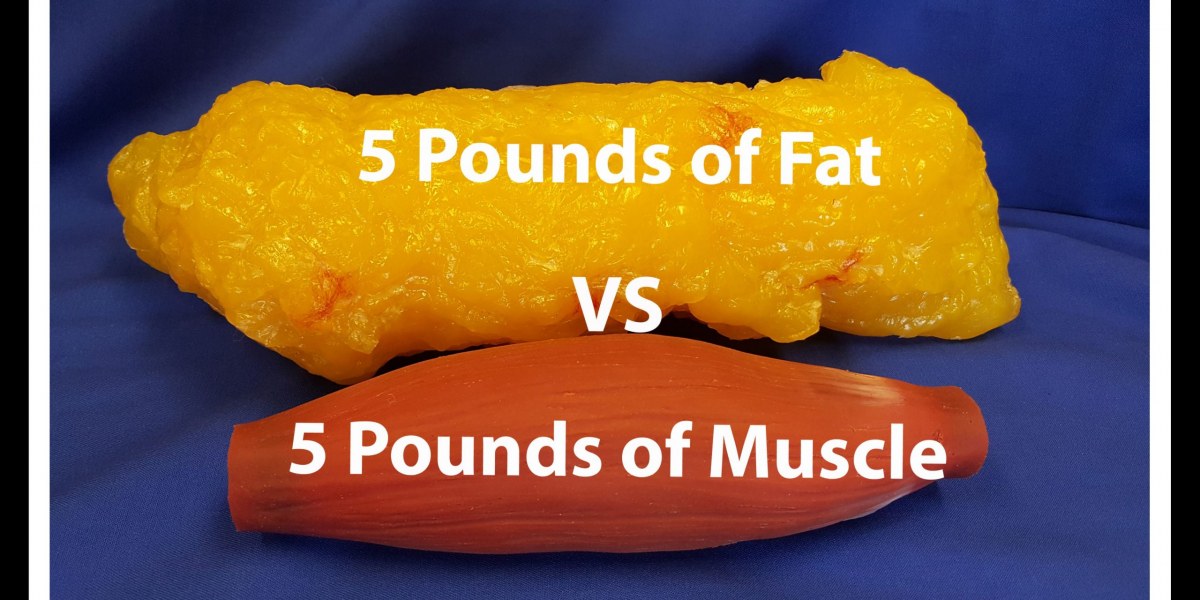FYI: The number on the scale isn’t always an indicator of overall health.
Does fat weigh more than muscle, or does muscle weigh more than fat? While it seems common knowledge that muscle weighs more, that’s not quite right. The answer depends more on the volume of each.
Consider the trick question: “What weighs more, a pound of feathers or a pound of bricks?” The answer, of course, is neither. A pound is a pound, regardless of the material. However, that pound of feathers will look bigger and fluffier than a compact pound of bricks.
So, while we’re talking about the weight of both, the root of the question is really body size and body composition. While it should be said, first and foremost, that body size or weight is not necessarily an indication of health, there is some truth behind the saying that muscle weighs more than fat.
You can be slimmer at a heavier weight than someone lighter, depending on how much non-fat mass (muscle, bones, and organs) you have in proportion to fat mass. Here’s what you need to know.
Does Muscle Actually Weigh More Than Fat?
The short answer: Yes, it does weigh more than fat—by volume. It will weigh more if you take a bowl of fat and compare it to a same-sized bowl of muscle.
That’s the simple answer. But much more goes into that question, mainly how your body responds to these two tissues.
Muscle weighs more than fat because it’s denser. If you hold a fistful of muscle, it will weigh more than a fistful of fat because you technically have more compact tissue in your hand.
The catch: That number on the scale shouldn’t matter here because the benefits of having more muscle tissue in the body outweigh having more fat tissue.
How Having More Muscle Affects Your Health
Muscle is a star player in keeping your body happy and healthy long-term for several reasons.
For starters, lean muscle mass can help manage blood sugar, keeping Type 2 diabetes at bay. A 2017 study published in PLoS One found a negative association between muscle mass and Type 2 diabetes—specifically, higher muscle mass meant a lower chance of developing the condition.
“The number one consumer of blood sugar in the human body is skeletal muscle,” explained Tim Church, MD, MPH, Ph.D., professor of preventive medicine at Pennington Biomedical Research Center at Louisiana State University. So, the more muscle you have, the greater your potential to stabilize your blood sugar.
As a bonus, the blood sugar-regulating effect is instant and lasts after exercise. So if you do a workout today, your muscles will utilize blood sugar better over the next 72 hours, Church said.
Also, as you age, you’ll want a healthy amount of muscle rather than fat.
“Muscle is a commonly overlooked marker of healthy aging,” Church said. You start losing muscle mass around age 40 or 45. This age-related decline in muscle is known as sarcopenia, one of the biggest reasons many older adults can have trouble doing simple tasks without help.
“You can’t put your jacket on, push yourself off the toilet, and get yourself off the ground after you fall,” Church said. “It all comes down to strength and muscle mass.”
Even better news is that muscle can help you maintain a healthy weight by raising your basal metabolic rate or the number of calories you burn at rest. Exactly how many extra calories you’ll burn by adding muscle is unclear.
Lastly—and least importantly, in terms of health—the muscle density might cause it to weigh more, which also means it takes up less space in the body. If someone gains 10 pounds of muscle, a lot of times they’ll barely notice that on their body, whereas, if you gain five or 10 pounds of fat, you definitely notice that.
How Having Too Much Fat Affects You
While it’s easy to see fat as an enemy, you need body fat to survive and thrive. Fat tissue plays a few critical roles, from regulating body temperature and producing hormones to supporting brain health and insulating organs, said Church.
According to the American Council on Exercise (ACE), healthy body fat percentages for women range from 10%-31%. For men, it’s 2%-24%. The American College of Sports Medicine recommends 25% as the maximum for men older than 60.
However, it’s important to note that the lower recommended body fat percentages often indicate a trained athlete and may not be realistic, sustainable, or healthy for the average individual.
“People think fat is just excess energy storage, but it’s really the number one driver of inflammatory markers in your blood,” Church said. Chronic, or long-term, inflammation can contribute to various conditions, including Type 2 diabetes, arthritis, inflammatory bowel disease, and obesity.
A high body fat percentage has also been linked to heart problems. There’s a strong correlation between higher levels of body fat and an increased risk for cardiovascular disease and a number of other health issues.
How To Lose Fat and Gain Muscle in a Healthy Way
Strength training is the smartest move for building muscle and cutting back on fat.
If you only have a limited amount of time to work out, strength training is exponentially more powerful; you could manipulate work and rest ratios to get more cardio benefits from your strength routine.
It is recommended doing a full-body strength routine at least twice a week. Try lifting to the point of near-failure in each set—that means those last one or two reps should feel nearly impossible to do without breaking form.
If you’re trying to shed fat while building muscle, keep the rest periods short between sets (30 to 60 seconds) to crank up the intensity of the sweat session. Choose five to six exercises (three lower-body, three upper-body) and shoot for 3-4 sets of 6-12 reps per move.
In a nutshell
Muscle tissue weighs more than fat tissue if both take up the same amount of space. So, if you have a cup of muscle and one of fat, the muscle will weigh more. But don’t let the prospect of weighing more keep you from building muscle, which will help you improve your health, reduce your risk of chronic disease, and age better.




